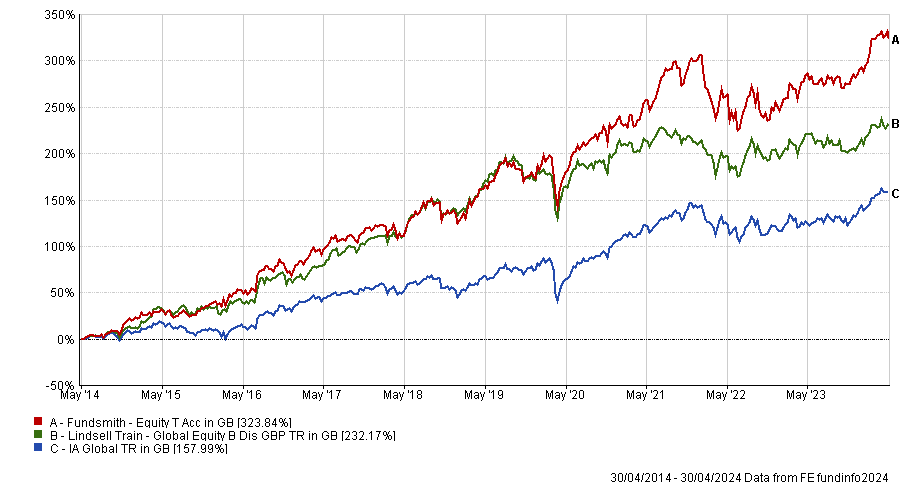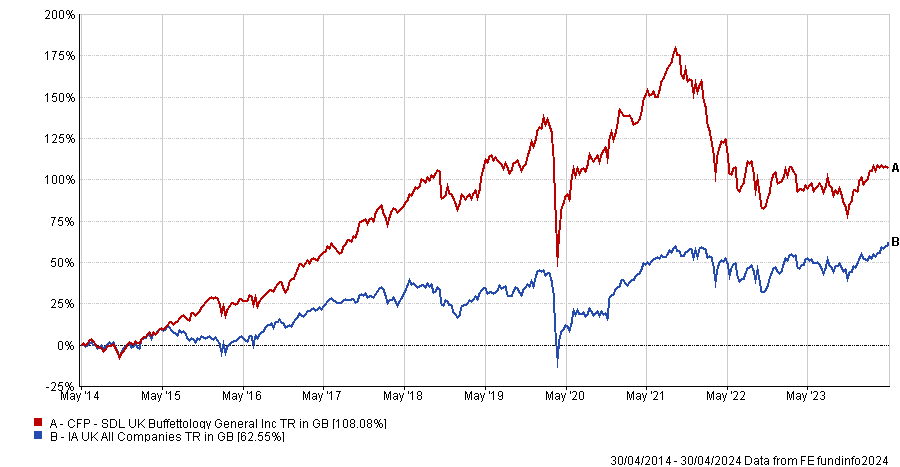How to invest like Warren Buffett.
Investors could emulate the Sage of Omaha by reinvesting dividends, holding stocks forever and only investing in areas they understand – or by buying Berkshire Hathaway shares.
- Emma Wallis
- 4 min reading time

Source: Trustnet
Berkshire Hathaway’s Warren Buffett is one of the most successful investors of all time but the basic tenets of his approach are uncomplicated and can be adopted by private investors. What’s more, there are several ways to gain exposure to Berkshire Hathaway directly or to funds with similar approaches.
Since the start of Buffett’s career in 1965, Berkshire Hathaway has produced a staggering 4,384,749% return, turning $100 into more than $4.3m. An investor who put $100 into the S&P 500 index in 1965 instead would have made $31,323.
If this makes you want to invest in Berkshire Hathaway, chances are that you already do.
Berkshire Hathaway is the seventh biggest stock in the US, having overtaken Tesla this year, so anyone owning an S&P 500 tracker will have 1.8% in Berkshire Hathway, which falls to about 1% for passive global equity funds.
Investors who want to increase their exposure can buy ‘B’ class shares in Berkshire Hathaway, which is quoted on the New York Stock Exchange, for £330 each and these shares can be held in an ISA, SIPP or standard trading account.
However, Laith Khalaf, head of investment analysis at AJ Bell, pointed out that “Berkshire is a bit of a strange beast, part holding company, part investment portfolio, so it’s set apart from a normal investment trust or fund, though it is still a capital allocation vehicle for Warren Buffett”.
Therefore, some investors might prefer to opt for a fund with a similar investment philosophy to Buffett and there are plenty of choices.
“Lindsell Train also hunts for high-quality companies with competitive advantages and quotes Buffett in its investment philosophy,” Khalaf said.
“Fundsmith’s mantra of ‘buy good companies, don’t overpay and do nothing’ could easily have been penned by Buffett and the publication of an ‘owner’s manual’ was an idea pioneered by Buffett in the 1990s.”
Performance of funds versus sector over 10 years

Source: FE Analytics
Khalaf continued: “Meanwhile, a lesser known fund, SDL UK Buffettology, explicitly seeks to replicate Buffett’s investment style within the confines of the UK stock market.
“Buffett’s pawprints can be found liberally spattered across the investment management industry in one form or another.”
Performance of fund versus sector over 10 years

Source: FE Analytics
Investors could go one step further and adopt Buffett’s principles themselves.
First and foremost, Buffett is an advocate of long-term, buy-and-hold investing. “Our favourite holding period is forever,” is one of his most-quoted sayings.
Khalaf added a word of caution: “Investors should also be wary of letting a long-term view slip into complacency or apathy, which can be harmful if poorly performing stocks or funds in your portfolio aren’t occasionally weeded out.”
Despite being one of the world’s best-known active managers, Buffett is an advocate of cheap passive funds. In his will, he has requested that 90% of the money he leaves to his wife be invested in a low cost S&P 500 tracker and the other 10% be held in short-term government bonds.
For investors who do want to take a punt on active managers, the Buffett way is to opt for high-conviction strategies. As Khalaf explained: “The point is, if you are going to invest in active funds, you should do it properly by choosing a manager who acts with conviction and puts meaningful sums into each of the companies they back, rather than placing a chip in most of the companies on the stock market.”
For investors who do not need to draw an income from their portfolio, dividends should be reinvested. “Buffett likes to receive dividends, even though Berkshire Hathaway doesn’t pay one,” Khalaf said. Instead, Buffett recycles dividend income into new investment opportunities.
“The long-term benefits of rolling up dividends are clear, particularly when investing in a high yield market like the UK, and especially if maintained within the tax sheltering walls of an ISA,” he added.
Finally, never invest in something you do not understand and that applies especially to cryptocurrency. Buffett went so far as to say that cryptocurrencies are “probably rat poison squared” and “they will come to a bad ending”.


